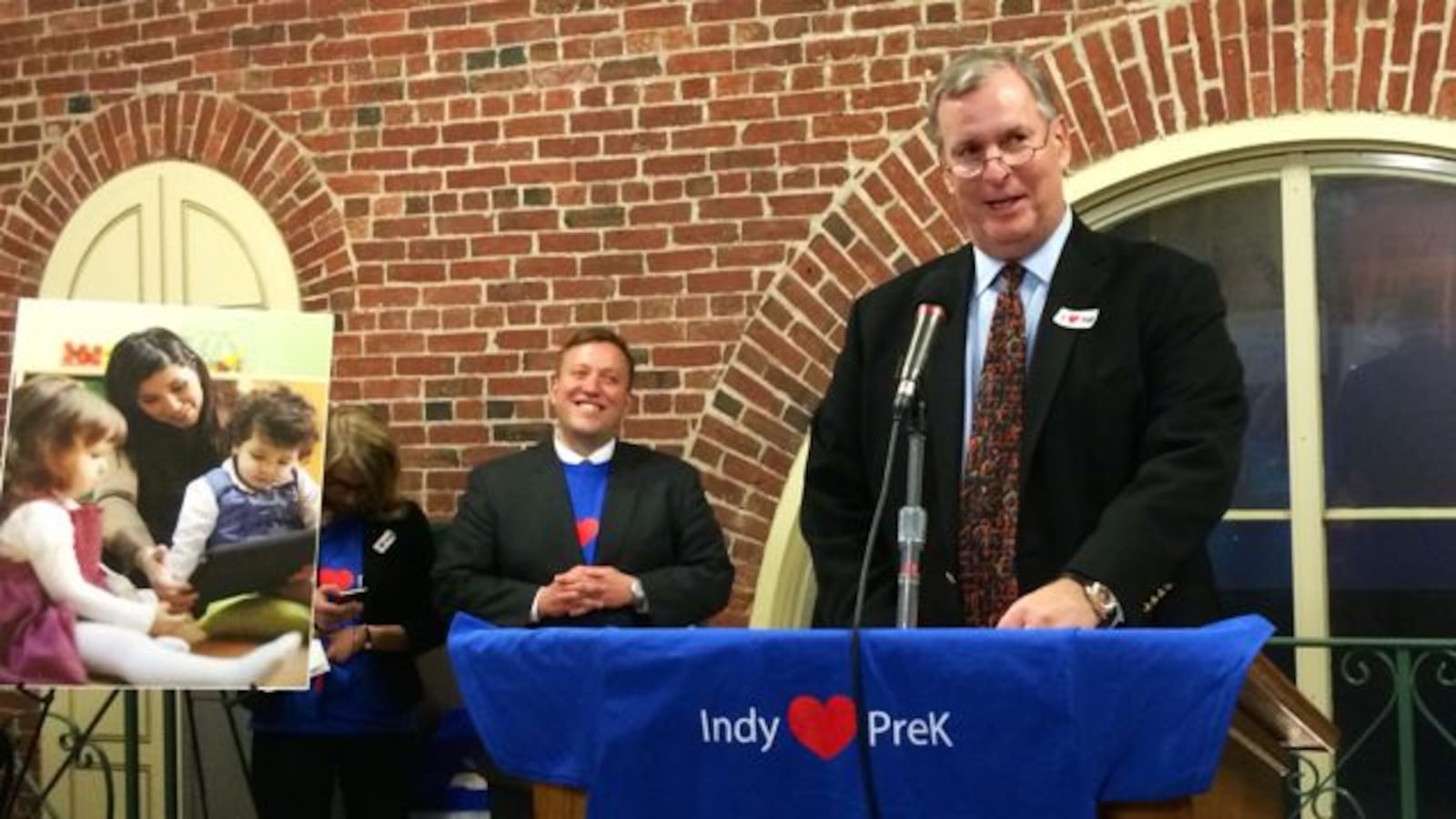Indianapolis Mayor Greg Ballard’s office overseeing education programs and charter schools is undergoing a transition.
Friday is the last day of work for Deputy Mayor Jason Kloth, who came in 2012 from Teach For America to the newly created position of deputy mayor for education. He’s headed to a new post focused on improving workforce development for a non-profit.
Brandon Brown, who oversaw charter schools in Kloth’s office, left earlier this month for a job as vice president of The Mind Trust, an Indianapolis non-profit that works to spur innovation and change in education.
Kristin Hines will now oversee charter school work for Ballard. Hines was an academic and policy analyst for Ballard’s charter school office who previously worked at the Indiana Department of Education. The Purdue University graduate also taught through Teach For America in Texas.
The changes come seven months after Ballard announced he would not run for re-election. Democrat Joe Hogsett and Republican Chuck Brewer are running to replace him. The election is Nov. 3.
Kloth’s next job is focused on finding ways to smooth the transition from high school to college, technical education or jobs, and to ensure students enter the workforce with the skills employers are demanding. The role is a new effort of the Central Indiana Corporate Partnership, a collaboration of the leaders of top companies, universities and philanthropic groups in the city.
Kloth was just 31 and working in Washington, D.C., as Teach For America’s senior vice president when Ballard tapped him as deputy mayor. The Champaign, Ill., native was sent by Teach For America to teach sixth grade in Texas near the Mexican border after graduating from the University of Illinois. Teach For America is a national organization that places recent college graduates as teachers in low-income schools nationwide for two-year stints.
Kloth came to Indianapolis in 2008 as the first local executive director when Teach For America began placing teachers here before leaving for the Washington office in 2010. Before becoming deputy mayor for education, he turned down a similar job in Chicago.
At the time, Ballard cited Kloth’s “national-level credibility” in the education reform debate.
As deputy mayor, Kloth led four key efforts: establishing a city-backed preschool tuition program, growing the mayor’s stable of charter schools, closing down troubled charter schools and helping craft laws to support the mayor’s efforts to improve schools.
The preschool program, announced last summer, was not fully approved until March after objections from City-County Council Democrats about the proposed funding method. The final plan, however, is one of Ballard’s signature accomplishments: a five-year, $40 million public-private partnership to pay preschool tuition for poor children. The city approved the first $4 million of an expected $20 million contribution this year. The rest was raised by business and philanthropic groups.
The program saw huge demand with about 5,000 applicants for 1,300 spots for the first year.
“We think there will be a substantial return on investment, especially for low-income children,” Kloth said.
On charter schools, the mayor’s office sponsored 22 at the start of Ballard’s term but will oversee 40 charter schools by 2017. The rapid expansion comes even after five mayor-sponsored charter schools closed down.
Two of those schools closed amid raucous debate.
The Project School was shut down because of academic and financial difficulties just weeks before the start of the 2012-13 school year, and Flanner House School closed last fall amid allegations that adults cheated on the state ISTEP test by changing student answers.
The others — Andrew Academy, Padua Academy and Monument Lighthouse — decided to close, merge or convert to private schools after consultation with Kloth and his team about poor test scores.
Kloth said holding charter schools accountable when they don’t live up to expectations and expanding those that do well are critical to the mayor’s charter school work.
“It’s important to ensure those who receive charters meet the promises they laid out to students, neighborhoods and the taxpayer,” he said.
Kloth also played a role in crafting new state education laws.
He worked with Indianapolis Public Schools Superintendent Lewis Ferebee and legislators on a bill that gave the district more flexibility to partner with charter schools or other outside organizations to overhaul low-scoring schools.
He also helped push through a law that passed late in this year’s legislative session to require Marion County schools to report more data on discipline broken down by race and ethnicity in response to concerns that some groups — notably African-American boys — were routinely disciplined more harshly at some schools.
In his new role, Kloth said he hopes to find strategies to close the gap between the 54 percent of jobs in Indianapolis that require some higher education and the 47 percent of people who qualify for those jobs.
The difference results in higher poverty and a missed opportunity for the state, he said.
“This issue deserves dramatically more attention than its receiving,” he said. “How can we assure students can transition form high school with the certification they need, or to a path to technical education or a two or four year degree, so they can enter the middle class and have a meaningful career?”


